Newly Graduated RNs: Belonging, Emotional Intelligence, and Practice
VerifiedAdded on 2022/09/16
|11
|3087
|22
Essay
AI Summary
This essay critically analyzes the application of belongingness, emotional intelligence, resilience, and communication in the practice of newly graduated Registered Nurses (RNs). It highlights the challenges faced by new nurses, including lack of confidence and difficulties in communication, which can lead to burnout. The essay emphasizes the importance of these four concepts in fostering a positive work-life balance and delivering patient-centered care. It defines and explores each concept, discussing how belongingness, emotional intelligence, resilience, and communication contribute to effective nursing practice and positive patient outcomes. Furthermore, it examines the role of patient-centered care, emphasizing the importance of patient preferences, values, and involvement in their care. The essay also references Picker's Eight Principles of Patient-Centered Care and discusses how these principles can improve patient experience. The importance of these elements in creating a supportive environment for new graduate nurses, enhancing their ability to adapt to challenges, and improving patient care is emphasized throughout the essay.
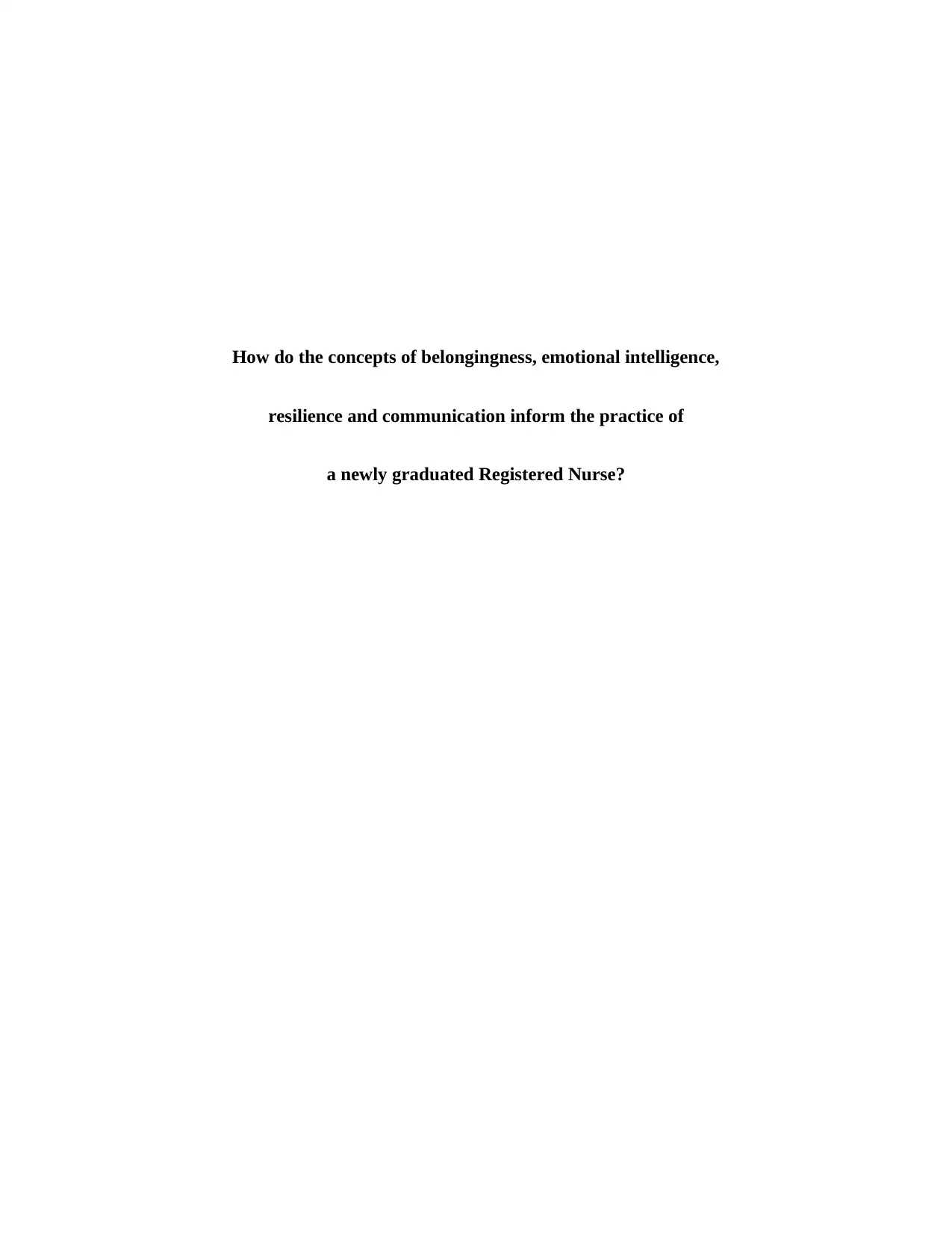
How do the concepts of belongingness, emotional intelligence,
resilience and communication inform the practice of
a newly graduated Registered Nurse?
resilience and communication inform the practice of
a newly graduated Registered Nurse?
Paraphrase This Document
Need a fresh take? Get an instant paraphrase of this document with our AI Paraphraser
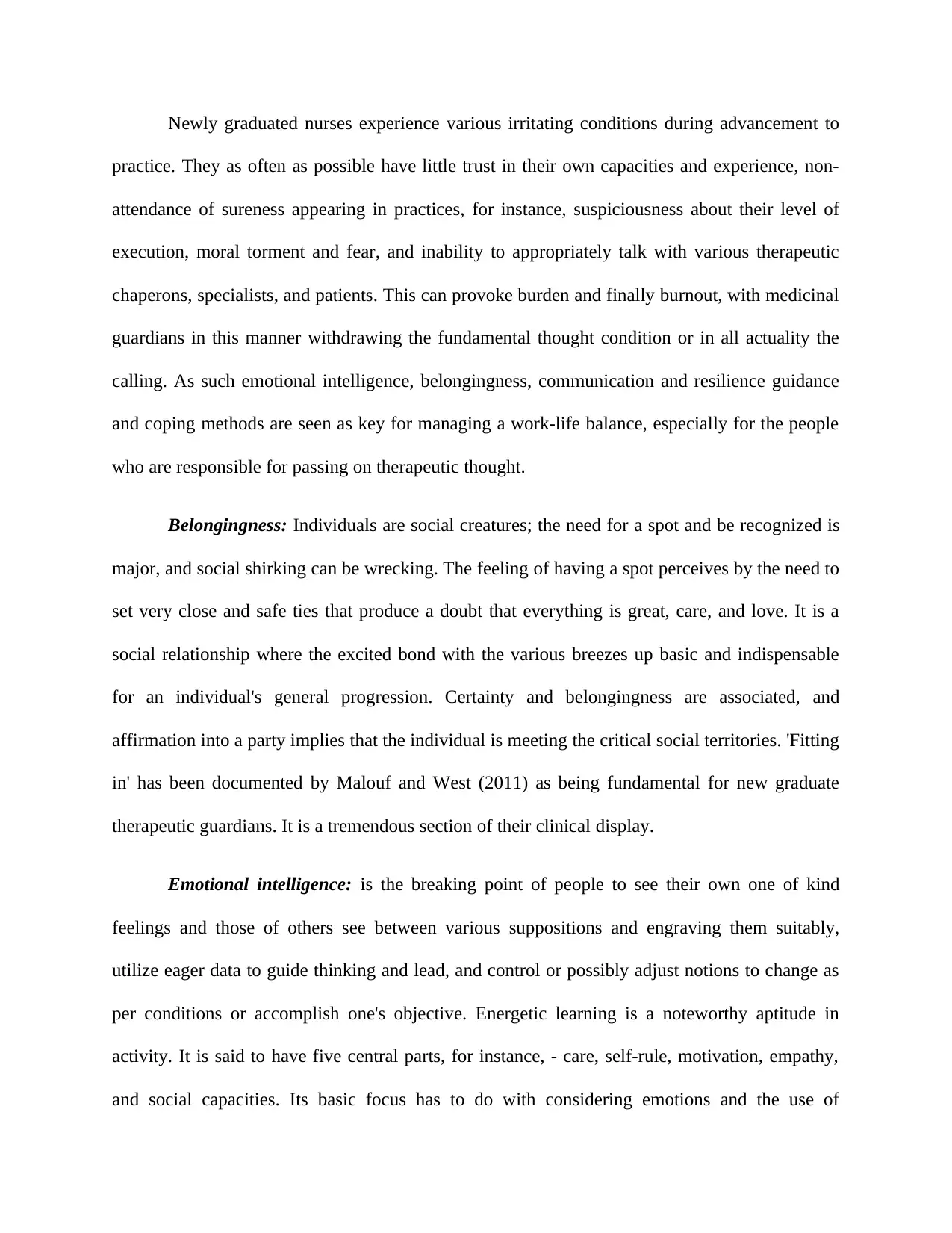
Newly graduated nurses experience various irritating conditions during advancement to
practice. They as often as possible have little trust in their own capacities and experience, non-
attendance of sureness appearing in practices, for instance, suspiciousness about their level of
execution, moral torment and fear, and inability to appropriately talk with various therapeutic
chaperons, specialists, and patients. This can provoke burden and finally burnout, with medicinal
guardians in this manner withdrawing the fundamental thought condition or in all actuality the
calling. As such emotional intelligence, belongingness, communication and resilience guidance
and coping methods are seen as key for managing a work-life balance, especially for the people
who are responsible for passing on therapeutic thought.
Belongingness: Individuals are social creatures; the need for a spot and be recognized is
major, and social shirking can be wrecking. The feeling of having a spot perceives by the need to
set very close and safe ties that produce a doubt that everything is great, care, and love. It is a
social relationship where the excited bond with the various breezes up basic and indispensable
for an individual's general progression. Certainty and belongingness are associated, and
affirmation into a party implies that the individual is meeting the critical social territories. 'Fitting
in' has been documented by Malouf and West (2011) as being fundamental for new graduate
therapeutic guardians. It is a tremendous section of their clinical display.
Emotional intelligence: is the breaking point of people to see their own one of kind
feelings and those of others see between various suppositions and engraving them suitably,
utilize eager data to guide thinking and lead, and control or possibly adjust notions to change as
per conditions or accomplish one's objective. Energetic learning is a noteworthy aptitude in
activity. It is said to have five central parts, for instance, - care, self-rule, motivation, empathy,
and social capacities. Its basic focus has to do with considering emotions and the use of
practice. They as often as possible have little trust in their own capacities and experience, non-
attendance of sureness appearing in practices, for instance, suspiciousness about their level of
execution, moral torment and fear, and inability to appropriately talk with various therapeutic
chaperons, specialists, and patients. This can provoke burden and finally burnout, with medicinal
guardians in this manner withdrawing the fundamental thought condition or in all actuality the
calling. As such emotional intelligence, belongingness, communication and resilience guidance
and coping methods are seen as key for managing a work-life balance, especially for the people
who are responsible for passing on therapeutic thought.
Belongingness: Individuals are social creatures; the need for a spot and be recognized is
major, and social shirking can be wrecking. The feeling of having a spot perceives by the need to
set very close and safe ties that produce a doubt that everything is great, care, and love. It is a
social relationship where the excited bond with the various breezes up basic and indispensable
for an individual's general progression. Certainty and belongingness are associated, and
affirmation into a party implies that the individual is meeting the critical social territories. 'Fitting
in' has been documented by Malouf and West (2011) as being fundamental for new graduate
therapeutic guardians. It is a tremendous section of their clinical display.
Emotional intelligence: is the breaking point of people to see their own one of kind
feelings and those of others see between various suppositions and engraving them suitably,
utilize eager data to guide thinking and lead, and control or possibly adjust notions to change as
per conditions or accomplish one's objective. Energetic learning is a noteworthy aptitude in
activity. It is said to have five central parts, for instance, - care, self-rule, motivation, empathy,
and social capacities. Its basic focus has to do with considering emotions and the use of
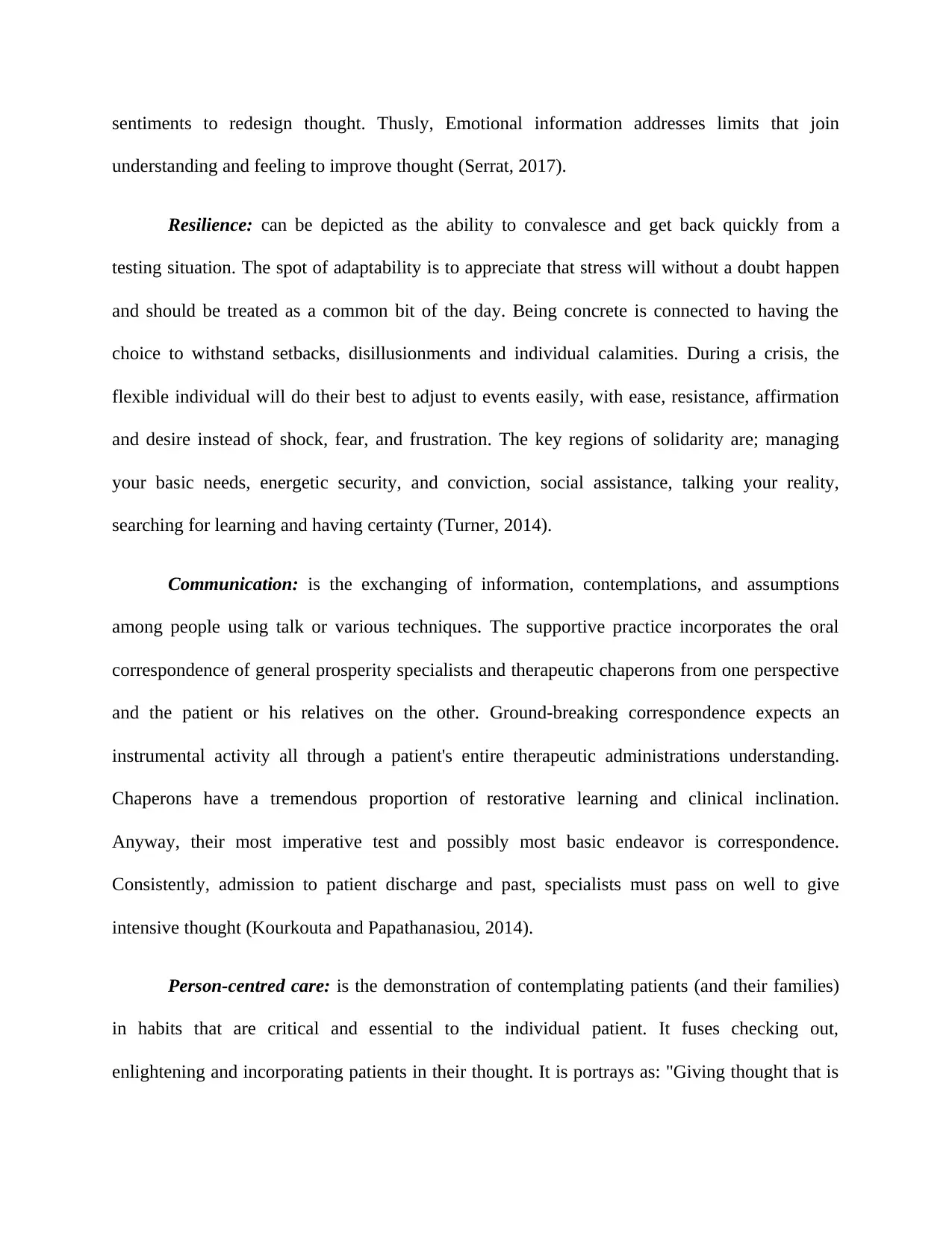
sentiments to redesign thought. Thusly, Emotional information addresses limits that join
understanding and feeling to improve thought (Serrat, 2017).
Resilience: can be depicted as the ability to convalesce and get back quickly from a
testing situation. The spot of adaptability is to appreciate that stress will without a doubt happen
and should be treated as a common bit of the day. Being concrete is connected to having the
choice to withstand setbacks, disillusionments and individual calamities. During a crisis, the
flexible individual will do their best to adjust to events easily, with ease, resistance, affirmation
and desire instead of shock, fear, and frustration. The key regions of solidarity are; managing
your basic needs, energetic security, and conviction, social assistance, talking your reality,
searching for learning and having certainty (Turner, 2014).
Communication: is the exchanging of information, contemplations, and assumptions
among people using talk or various techniques. The supportive practice incorporates the oral
correspondence of general prosperity specialists and therapeutic chaperons from one perspective
and the patient or his relatives on the other. Ground-breaking correspondence expects an
instrumental activity all through a patient's entire therapeutic administrations understanding.
Chaperons have a tremendous proportion of restorative learning and clinical inclination.
Anyway, their most imperative test and possibly most basic endeavor is correspondence.
Consistently, admission to patient discharge and past, specialists must pass on well to give
intensive thought (Kourkouta and Papathanasiou, 2014).
Person-centred care: is the demonstration of contemplating patients (and their families)
in habits that are critical and essential to the individual patient. It fuses checking out,
enlightening and incorporating patients in their thought. It is portrays as: "Giving thought that is
understanding and feeling to improve thought (Serrat, 2017).
Resilience: can be depicted as the ability to convalesce and get back quickly from a
testing situation. The spot of adaptability is to appreciate that stress will without a doubt happen
and should be treated as a common bit of the day. Being concrete is connected to having the
choice to withstand setbacks, disillusionments and individual calamities. During a crisis, the
flexible individual will do their best to adjust to events easily, with ease, resistance, affirmation
and desire instead of shock, fear, and frustration. The key regions of solidarity are; managing
your basic needs, energetic security, and conviction, social assistance, talking your reality,
searching for learning and having certainty (Turner, 2014).
Communication: is the exchanging of information, contemplations, and assumptions
among people using talk or various techniques. The supportive practice incorporates the oral
correspondence of general prosperity specialists and therapeutic chaperons from one perspective
and the patient or his relatives on the other. Ground-breaking correspondence expects an
instrumental activity all through a patient's entire therapeutic administrations understanding.
Chaperons have a tremendous proportion of restorative learning and clinical inclination.
Anyway, their most imperative test and possibly most basic endeavor is correspondence.
Consistently, admission to patient discharge and past, specialists must pass on well to give
intensive thought (Kourkouta and Papathanasiou, 2014).
Person-centred care: is the demonstration of contemplating patients (and their families)
in habits that are critical and essential to the individual patient. It fuses checking out,
enlightening and incorporating patients in their thought. It is portrays as: "Giving thought that is
⊘ This is a preview!⊘
Do you want full access?
Subscribe today to unlock all pages.

Trusted by 1+ million students worldwide
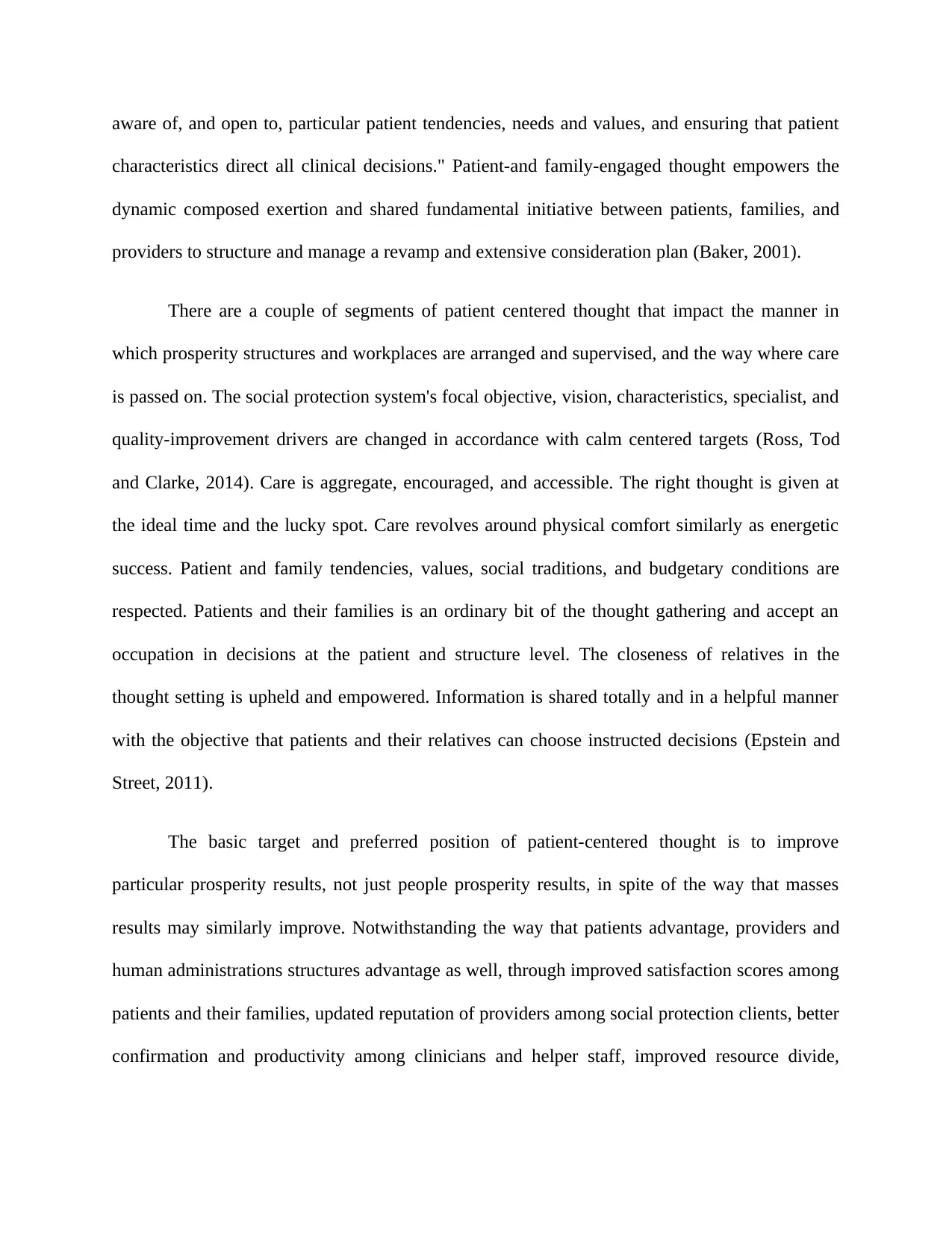
aware of, and open to, particular patient tendencies, needs and values, and ensuring that patient
characteristics direct all clinical decisions." Patient-and family-engaged thought empowers the
dynamic composed exertion and shared fundamental initiative between patients, families, and
providers to structure and manage a revamp and extensive consideration plan (Baker, 2001).
There are a couple of segments of patient centered thought that impact the manner in
which prosperity structures and workplaces are arranged and supervised, and the way where care
is passed on. The social protection system's focal objective, vision, characteristics, specialist, and
quality-improvement drivers are changed in accordance with calm centered targets (Ross, Tod
and Clarke, 2014). Care is aggregate, encouraged, and accessible. The right thought is given at
the ideal time and the lucky spot. Care revolves around physical comfort similarly as energetic
success. Patient and family tendencies, values, social traditions, and budgetary conditions are
respected. Patients and their families is an ordinary bit of the thought gathering and accept an
occupation in decisions at the patient and structure level. The closeness of relatives in the
thought setting is upheld and empowered. Information is shared totally and in a helpful manner
with the objective that patients and their relatives can choose instructed decisions (Epstein and
Street, 2011).
The basic target and preferred position of patient-centered thought is to improve
particular prosperity results, not just people prosperity results, in spite of the way that masses
results may similarly improve. Notwithstanding the way that patients advantage, providers and
human administrations structures advantage as well, through improved satisfaction scores among
patients and their families, updated reputation of providers among social protection clients, better
confirmation and productivity among clinicians and helper staff, improved resource divide,
characteristics direct all clinical decisions." Patient-and family-engaged thought empowers the
dynamic composed exertion and shared fundamental initiative between patients, families, and
providers to structure and manage a revamp and extensive consideration plan (Baker, 2001).
There are a couple of segments of patient centered thought that impact the manner in
which prosperity structures and workplaces are arranged and supervised, and the way where care
is passed on. The social protection system's focal objective, vision, characteristics, specialist, and
quality-improvement drivers are changed in accordance with calm centered targets (Ross, Tod
and Clarke, 2014). Care is aggregate, encouraged, and accessible. The right thought is given at
the ideal time and the lucky spot. Care revolves around physical comfort similarly as energetic
success. Patient and family tendencies, values, social traditions, and budgetary conditions are
respected. Patients and their families is an ordinary bit of the thought gathering and accept an
occupation in decisions at the patient and structure level. The closeness of relatives in the
thought setting is upheld and empowered. Information is shared totally and in a helpful manner
with the objective that patients and their relatives can choose instructed decisions (Epstein and
Street, 2011).
The basic target and preferred position of patient-centered thought is to improve
particular prosperity results, not just people prosperity results, in spite of the way that masses
results may similarly improve. Notwithstanding the way that patients advantage, providers and
human administrations structures advantage as well, through improved satisfaction scores among
patients and their families, updated reputation of providers among social protection clients, better
confirmation and productivity among clinicians and helper staff, improved resource divide,
Paraphrase This Document
Need a fresh take? Get an instant paraphrase of this document with our AI Paraphraser
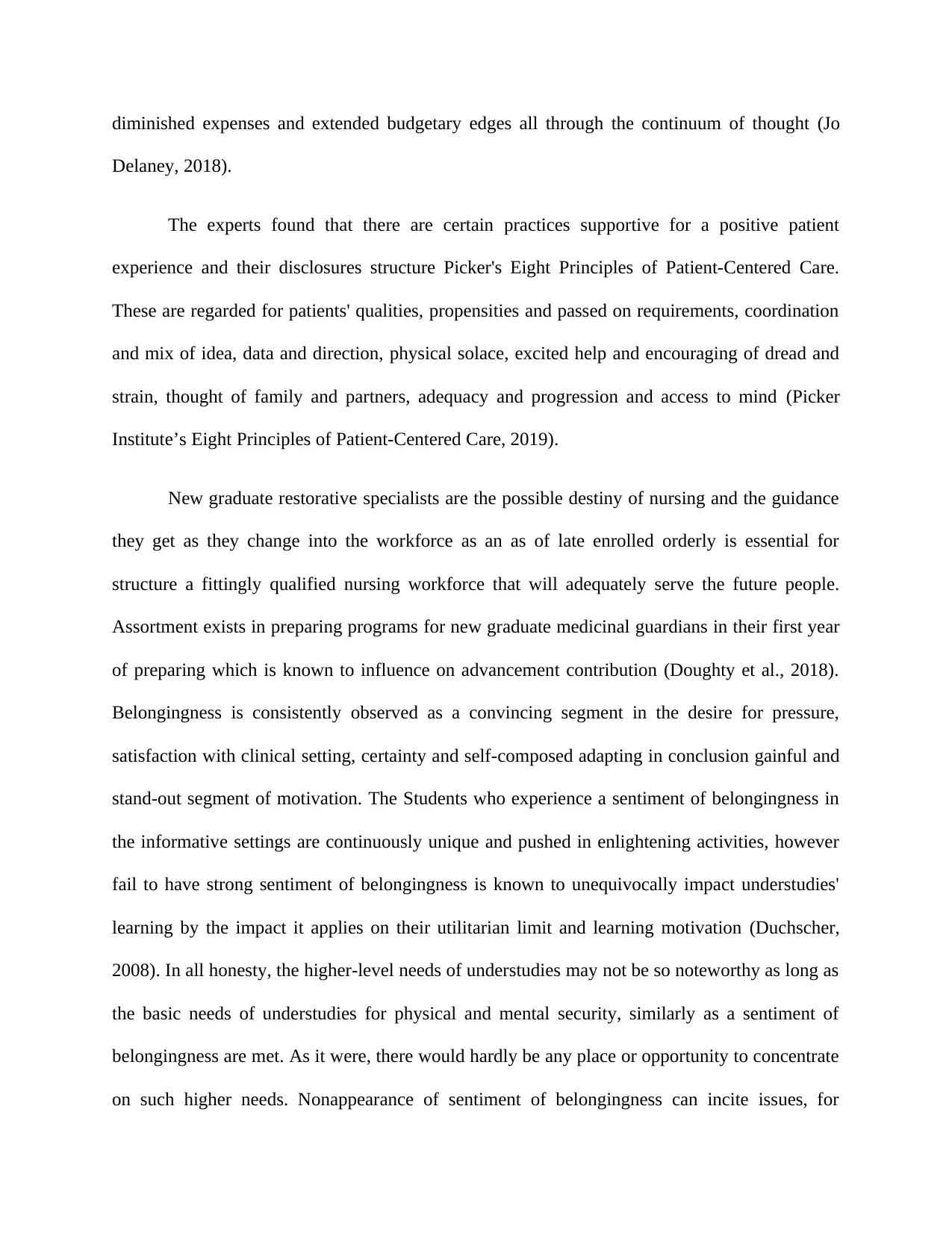
diminished expenses and extended budgetary edges all through the continuum of thought (Jo
Delaney, 2018).
The experts found that there are certain practices supportive for a positive patient
experience and their disclosures structure Picker's Eight Principles of Patient-Centered Care.
These are regarded for patients' qualities, propensities and passed on requirements, coordination
and mix of idea, data and direction, physical solace, excited help and encouraging of dread and
strain, thought of family and partners, adequacy and progression and access to mind (Picker
Institute’s Eight Principles of Patient-Centered Care, 2019).
New graduate restorative specialists are the possible destiny of nursing and the guidance
they get as they change into the workforce as an as of late enrolled orderly is essential for
structure a fittingly qualified nursing workforce that will adequately serve the future people.
Assortment exists in preparing programs for new graduate medicinal guardians in their first year
of preparing which is known to influence on advancement contribution (Doughty et al., 2018).
Belongingness is consistently observed as a convincing segment in the desire for pressure,
satisfaction with clinical setting, certainty and self-composed adapting in conclusion gainful and
stand-out segment of motivation. The Students who experience a sentiment of belongingness in
the informative settings are continuously unique and pushed in enlightening activities, however
fail to have strong sentiment of belongingness is known to unequivocally impact understudies'
learning by the impact it applies on their utilitarian limit and learning motivation (Duchscher,
2008). In all honesty, the higher-level needs of understudies may not be so noteworthy as long as
the basic needs of understudies for physical and mental security, similarly as a sentiment of
belongingness are met. As it were, there would hardly be any place or opportunity to concentrate
on such higher needs. Nonappearance of sentiment of belongingness can incite issues, for
Delaney, 2018).
The experts found that there are certain practices supportive for a positive patient
experience and their disclosures structure Picker's Eight Principles of Patient-Centered Care.
These are regarded for patients' qualities, propensities and passed on requirements, coordination
and mix of idea, data and direction, physical solace, excited help and encouraging of dread and
strain, thought of family and partners, adequacy and progression and access to mind (Picker
Institute’s Eight Principles of Patient-Centered Care, 2019).
New graduate restorative specialists are the possible destiny of nursing and the guidance
they get as they change into the workforce as an as of late enrolled orderly is essential for
structure a fittingly qualified nursing workforce that will adequately serve the future people.
Assortment exists in preparing programs for new graduate medicinal guardians in their first year
of preparing which is known to influence on advancement contribution (Doughty et al., 2018).
Belongingness is consistently observed as a convincing segment in the desire for pressure,
satisfaction with clinical setting, certainty and self-composed adapting in conclusion gainful and
stand-out segment of motivation. The Students who experience a sentiment of belongingness in
the informative settings are continuously unique and pushed in enlightening activities, however
fail to have strong sentiment of belongingness is known to unequivocally impact understudies'
learning by the impact it applies on their utilitarian limit and learning motivation (Duchscher,
2008). In all honesty, the higher-level needs of understudies may not be so noteworthy as long as
the basic needs of understudies for physical and mental security, similarly as a sentiment of
belongingness are met. As it were, there would hardly be any place or opportunity to concentrate
on such higher needs. Nonappearance of sentiment of belongingness can incite issues, for
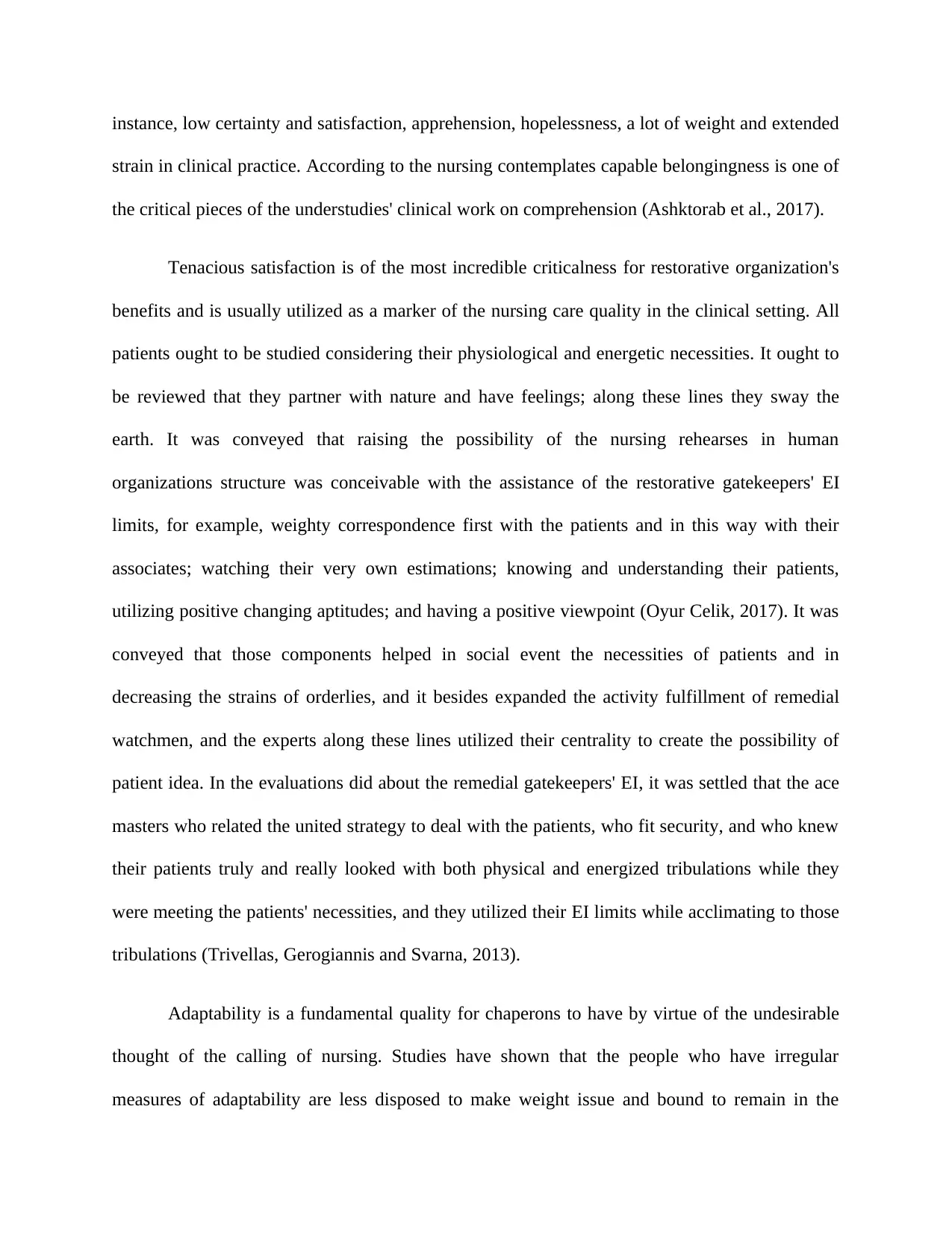
instance, low certainty and satisfaction, apprehension, hopelessness, a lot of weight and extended
strain in clinical practice. According to the nursing contemplates capable belongingness is one of
the critical pieces of the understudies' clinical work on comprehension (Ashktorab et al., 2017).
Tenacious satisfaction is of the most incredible criticalness for restorative organization's
benefits and is usually utilized as a marker of the nursing care quality in the clinical setting. All
patients ought to be studied considering their physiological and energetic necessities. It ought to
be reviewed that they partner with nature and have feelings; along these lines they sway the
earth. It was conveyed that raising the possibility of the nursing rehearses in human
organizations structure was conceivable with the assistance of the restorative gatekeepers' EI
limits, for example, weighty correspondence first with the patients and in this way with their
associates; watching their very own estimations; knowing and understanding their patients,
utilizing positive changing aptitudes; and having a positive viewpoint (Oyur Celik, 2017). It was
conveyed that those components helped in social event the necessities of patients and in
decreasing the strains of orderlies, and it besides expanded the activity fulfillment of remedial
watchmen, and the experts along these lines utilized their centrality to create the possibility of
patient idea. In the evaluations did about the remedial gatekeepers' EI, it was settled that the ace
masters who related the united strategy to deal with the patients, who fit security, and who knew
their patients truly and really looked with both physical and energized tribulations while they
were meeting the patients' necessities, and they utilized their EI limits while acclimating to those
tribulations (Trivellas, Gerogiannis and Svarna, 2013).
Adaptability is a fundamental quality for chaperons to have by virtue of the undesirable
thought of the calling of nursing. Studies have shown that the people who have irregular
measures of adaptability are less disposed to make weight issue and bound to remain in the
strain in clinical practice. According to the nursing contemplates capable belongingness is one of
the critical pieces of the understudies' clinical work on comprehension (Ashktorab et al., 2017).
Tenacious satisfaction is of the most incredible criticalness for restorative organization's
benefits and is usually utilized as a marker of the nursing care quality in the clinical setting. All
patients ought to be studied considering their physiological and energetic necessities. It ought to
be reviewed that they partner with nature and have feelings; along these lines they sway the
earth. It was conveyed that raising the possibility of the nursing rehearses in human
organizations structure was conceivable with the assistance of the restorative gatekeepers' EI
limits, for example, weighty correspondence first with the patients and in this way with their
associates; watching their very own estimations; knowing and understanding their patients,
utilizing positive changing aptitudes; and having a positive viewpoint (Oyur Celik, 2017). It was
conveyed that those components helped in social event the necessities of patients and in
decreasing the strains of orderlies, and it besides expanded the activity fulfillment of remedial
watchmen, and the experts along these lines utilized their centrality to create the possibility of
patient idea. In the evaluations did about the remedial gatekeepers' EI, it was settled that the ace
masters who related the united strategy to deal with the patients, who fit security, and who knew
their patients truly and really looked with both physical and energized tribulations while they
were meeting the patients' necessities, and they utilized their EI limits while acclimating to those
tribulations (Trivellas, Gerogiannis and Svarna, 2013).
Adaptability is a fundamental quality for chaperons to have by virtue of the undesirable
thought of the calling of nursing. Studies have shown that the people who have irregular
measures of adaptability are less disposed to make weight issue and bound to remain in the
⊘ This is a preview!⊘
Do you want full access?
Subscribe today to unlock all pages.

Trusted by 1+ million students worldwide
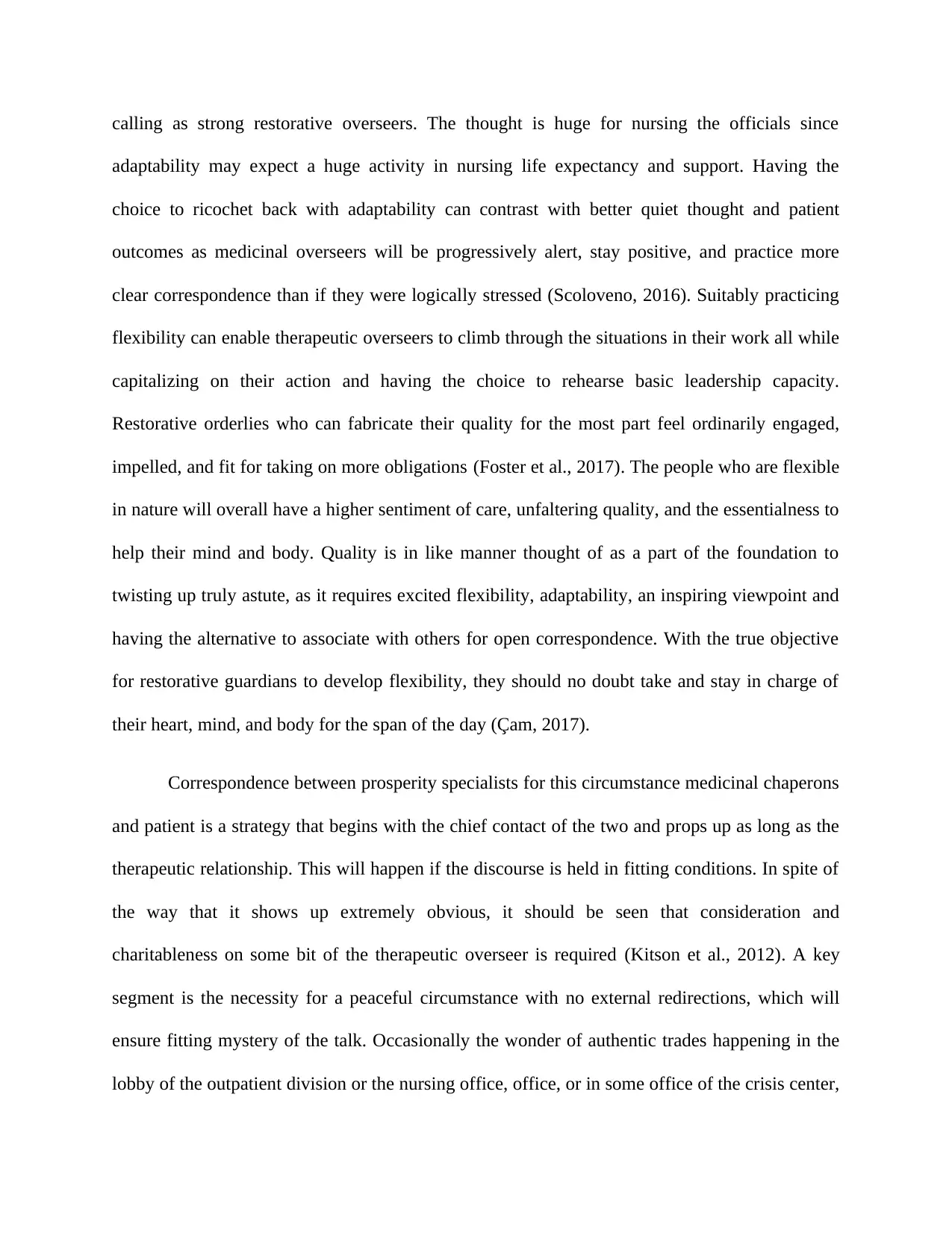
calling as strong restorative overseers. The thought is huge for nursing the officials since
adaptability may expect a huge activity in nursing life expectancy and support. Having the
choice to ricochet back with adaptability can contrast with better quiet thought and patient
outcomes as medicinal overseers will be progressively alert, stay positive, and practice more
clear correspondence than if they were logically stressed (Scoloveno, 2016). Suitably practicing
flexibility can enable therapeutic overseers to climb through the situations in their work all while
capitalizing on their action and having the choice to rehearse basic leadership capacity.
Restorative orderlies who can fabricate their quality for the most part feel ordinarily engaged,
impelled, and fit for taking on more obligations (Foster et al., 2017). The people who are flexible
in nature will overall have a higher sentiment of care, unfaltering quality, and the essentialness to
help their mind and body. Quality is in like manner thought of as a part of the foundation to
twisting up truly astute, as it requires excited flexibility, adaptability, an inspiring viewpoint and
having the alternative to associate with others for open correspondence. With the true objective
for restorative guardians to develop flexibility, they should no doubt take and stay in charge of
their heart, mind, and body for the span of the day (Çam, 2017).
Correspondence between prosperity specialists for this circumstance medicinal chaperons
and patient is a strategy that begins with the chief contact of the two and props up as long as the
therapeutic relationship. This will happen if the discourse is held in fitting conditions. In spite of
the way that it shows up extremely obvious, it should be seen that consideration and
charitableness on some bit of the therapeutic overseer is required (Kitson et al., 2012). A key
segment is the necessity for a peaceful circumstance with no external redirections, which will
ensure fitting mystery of the talk. Occasionally the wonder of authentic trades happening in the
lobby of the outpatient division or the nursing office, office, or in some office of the crisis center,
adaptability may expect a huge activity in nursing life expectancy and support. Having the
choice to ricochet back with adaptability can contrast with better quiet thought and patient
outcomes as medicinal overseers will be progressively alert, stay positive, and practice more
clear correspondence than if they were logically stressed (Scoloveno, 2016). Suitably practicing
flexibility can enable therapeutic overseers to climb through the situations in their work all while
capitalizing on their action and having the choice to rehearse basic leadership capacity.
Restorative orderlies who can fabricate their quality for the most part feel ordinarily engaged,
impelled, and fit for taking on more obligations (Foster et al., 2017). The people who are flexible
in nature will overall have a higher sentiment of care, unfaltering quality, and the essentialness to
help their mind and body. Quality is in like manner thought of as a part of the foundation to
twisting up truly astute, as it requires excited flexibility, adaptability, an inspiring viewpoint and
having the alternative to associate with others for open correspondence. With the true objective
for restorative guardians to develop flexibility, they should no doubt take and stay in charge of
their heart, mind, and body for the span of the day (Çam, 2017).
Correspondence between prosperity specialists for this circumstance medicinal chaperons
and patient is a strategy that begins with the chief contact of the two and props up as long as the
therapeutic relationship. This will happen if the discourse is held in fitting conditions. In spite of
the way that it shows up extremely obvious, it should be seen that consideration and
charitableness on some bit of the therapeutic overseer is required (Kitson et al., 2012). A key
segment is the necessity for a peaceful circumstance with no external redirections, which will
ensure fitting mystery of the talk. Occasionally the wonder of authentic trades happening in the
lobby of the outpatient division or the nursing office, office, or in some office of the crisis center,
Paraphrase This Document
Need a fresh take? Get an instant paraphrase of this document with our AI Paraphraser
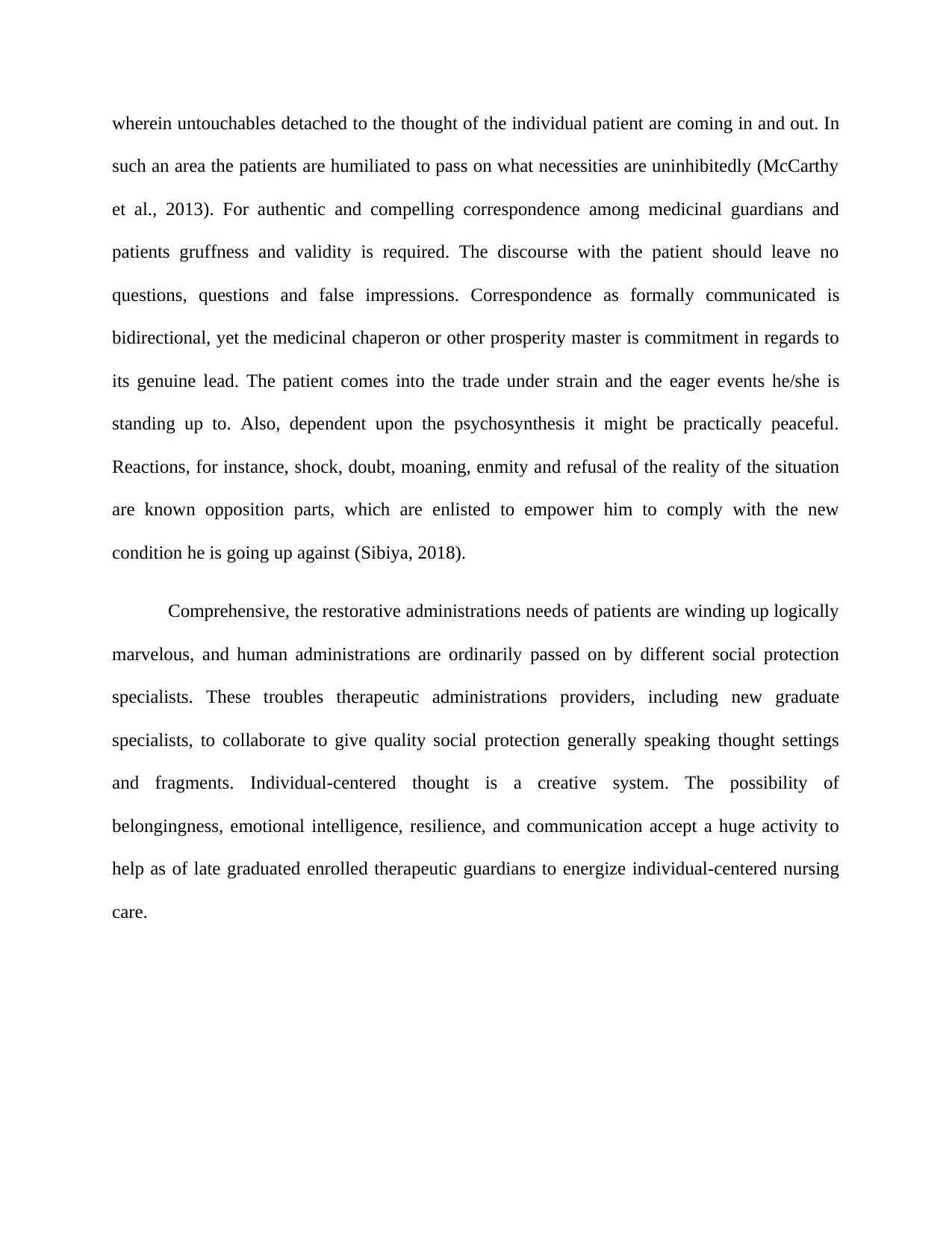
wherein untouchables detached to the thought of the individual patient are coming in and out. In
such an area the patients are humiliated to pass on what necessities are uninhibitedly (McCarthy
et al., 2013). For authentic and compelling correspondence among medicinal guardians and
patients gruffness and validity is required. The discourse with the patient should leave no
questions, questions and false impressions. Correspondence as formally communicated is
bidirectional, yet the medicinal chaperon or other prosperity master is commitment in regards to
its genuine lead. The patient comes into the trade under strain and the eager events he/she is
standing up to. Also, dependent upon the psychosynthesis it might be practically peaceful.
Reactions, for instance, shock, doubt, moaning, enmity and refusal of the reality of the situation
are known opposition parts, which are enlisted to empower him to comply with the new
condition he is going up against (Sibiya, 2018).
Comprehensive, the restorative administrations needs of patients are winding up logically
marvelous, and human administrations are ordinarily passed on by different social protection
specialists. These troubles therapeutic administrations providers, including new graduate
specialists, to collaborate to give quality social protection generally speaking thought settings
and fragments. Individual-centered thought is a creative system. The possibility of
belongingness, emotional intelligence, resilience, and communication accept a huge activity to
help as of late graduated enrolled therapeutic guardians to energize individual-centered nursing
care.
such an area the patients are humiliated to pass on what necessities are uninhibitedly (McCarthy
et al., 2013). For authentic and compelling correspondence among medicinal guardians and
patients gruffness and validity is required. The discourse with the patient should leave no
questions, questions and false impressions. Correspondence as formally communicated is
bidirectional, yet the medicinal chaperon or other prosperity master is commitment in regards to
its genuine lead. The patient comes into the trade under strain and the eager events he/she is
standing up to. Also, dependent upon the psychosynthesis it might be practically peaceful.
Reactions, for instance, shock, doubt, moaning, enmity and refusal of the reality of the situation
are known opposition parts, which are enlisted to empower him to comply with the new
condition he is going up against (Sibiya, 2018).
Comprehensive, the restorative administrations needs of patients are winding up logically
marvelous, and human administrations are ordinarily passed on by different social protection
specialists. These troubles therapeutic administrations providers, including new graduate
specialists, to collaborate to give quality social protection generally speaking thought settings
and fragments. Individual-centered thought is a creative system. The possibility of
belongingness, emotional intelligence, resilience, and communication accept a huge activity to
help as of late graduated enrolled therapeutic guardians to energize individual-centered nursing
care.
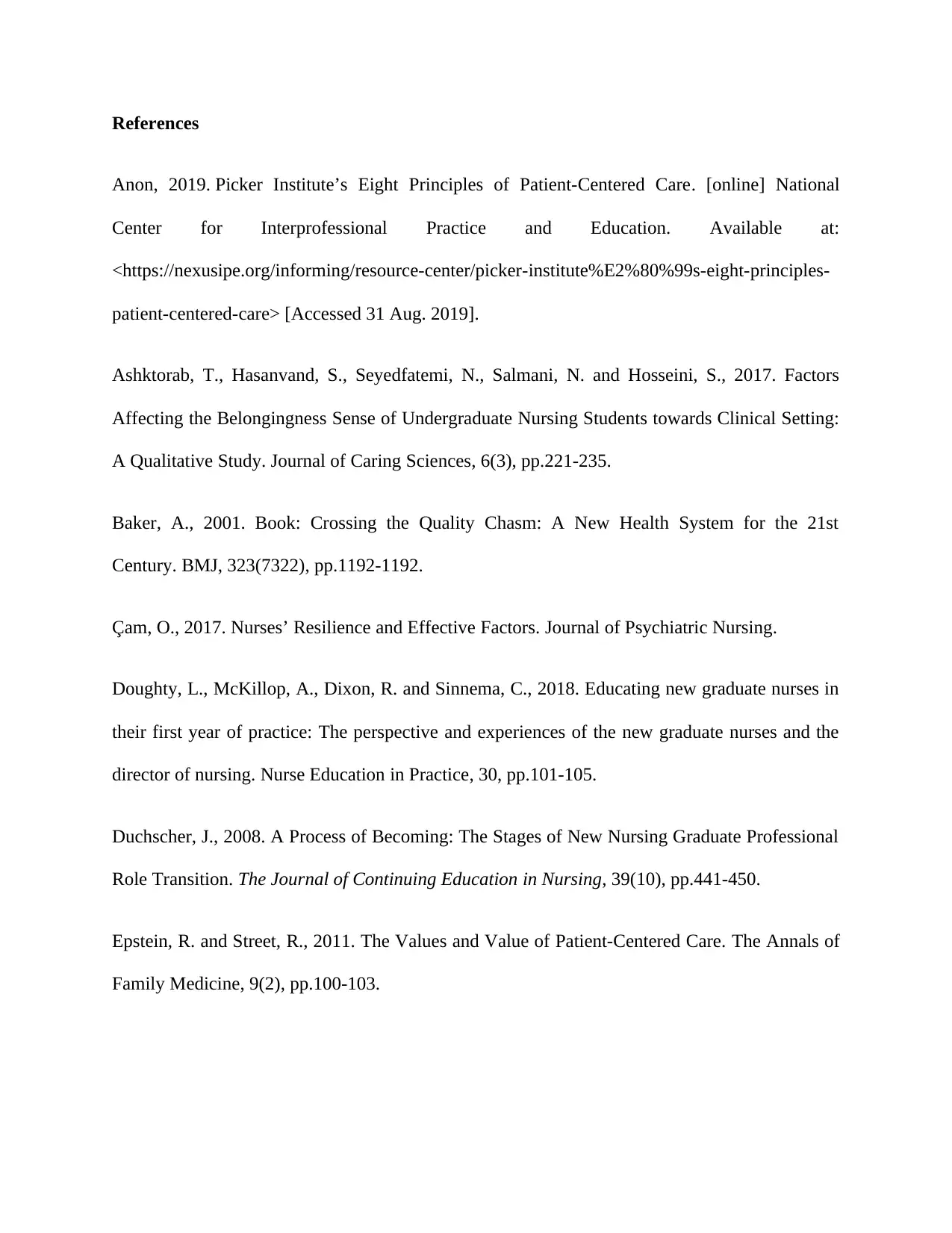
References
Anon, 2019. Picker Institute’s Eight Principles of Patient-Centered Care. [online] National
Center for Interprofessional Practice and Education. Available at:
<https://nexusipe.org/informing/resource-center/picker-institute%E2%80%99s-eight-principles-
patient-centered-care> [Accessed 31 Aug. 2019].
Ashktorab, T., Hasanvand, S., Seyedfatemi, N., Salmani, N. and Hosseini, S., 2017. Factors
Affecting the Belongingness Sense of Undergraduate Nursing Students towards Clinical Setting:
A Qualitative Study. Journal of Caring Sciences, 6(3), pp.221-235.
Baker, A., 2001. Book: Crossing the Quality Chasm: A New Health System for the 21st
Century. BMJ, 323(7322), pp.1192-1192.
Çam, O., 2017. Nurses’ Resilience and Effective Factors. Journal of Psychiatric Nursing.
Doughty, L., McKillop, A., Dixon, R. and Sinnema, C., 2018. Educating new graduate nurses in
their first year of practice: The perspective and experiences of the new graduate nurses and the
director of nursing. Nurse Education in Practice, 30, pp.101-105.
Duchscher, J., 2008. A Process of Becoming: The Stages of New Nursing Graduate Professional
Role Transition. The Journal of Continuing Education in Nursing, 39(10), pp.441-450.
Epstein, R. and Street, R., 2011. The Values and Value of Patient-Centered Care. The Annals of
Family Medicine, 9(2), pp.100-103.
Anon, 2019. Picker Institute’s Eight Principles of Patient-Centered Care. [online] National
Center for Interprofessional Practice and Education. Available at:
<https://nexusipe.org/informing/resource-center/picker-institute%E2%80%99s-eight-principles-
patient-centered-care> [Accessed 31 Aug. 2019].
Ashktorab, T., Hasanvand, S., Seyedfatemi, N., Salmani, N. and Hosseini, S., 2017. Factors
Affecting the Belongingness Sense of Undergraduate Nursing Students towards Clinical Setting:
A Qualitative Study. Journal of Caring Sciences, 6(3), pp.221-235.
Baker, A., 2001. Book: Crossing the Quality Chasm: A New Health System for the 21st
Century. BMJ, 323(7322), pp.1192-1192.
Çam, O., 2017. Nurses’ Resilience and Effective Factors. Journal of Psychiatric Nursing.
Doughty, L., McKillop, A., Dixon, R. and Sinnema, C., 2018. Educating new graduate nurses in
their first year of practice: The perspective and experiences of the new graduate nurses and the
director of nursing. Nurse Education in Practice, 30, pp.101-105.
Duchscher, J., 2008. A Process of Becoming: The Stages of New Nursing Graduate Professional
Role Transition. The Journal of Continuing Education in Nursing, 39(10), pp.441-450.
Epstein, R. and Street, R., 2011. The Values and Value of Patient-Centered Care. The Annals of
Family Medicine, 9(2), pp.100-103.
⊘ This is a preview!⊘
Do you want full access?
Subscribe today to unlock all pages.

Trusted by 1+ million students worldwide
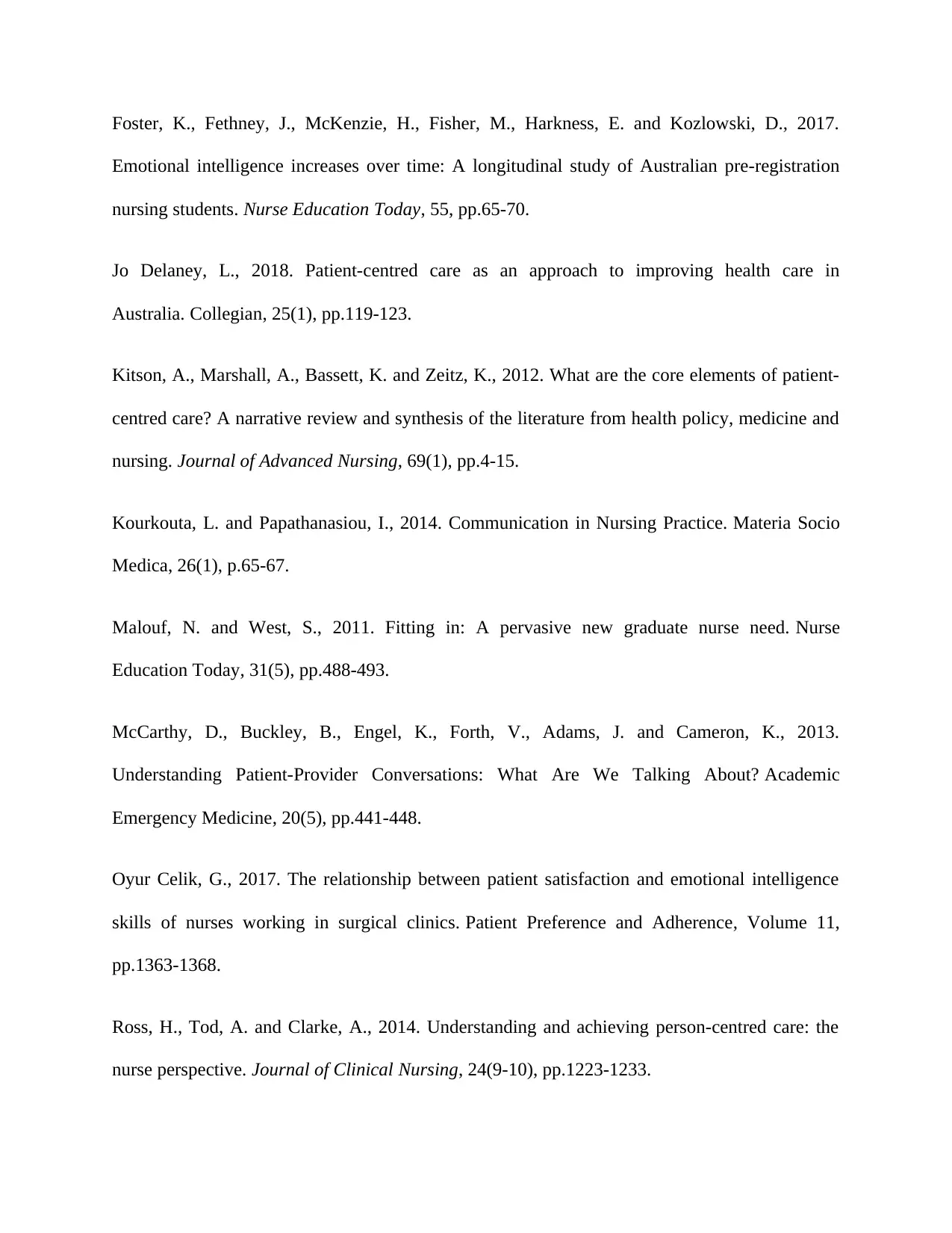
Foster, K., Fethney, J., McKenzie, H., Fisher, M., Harkness, E. and Kozlowski, D., 2017.
Emotional intelligence increases over time: A longitudinal study of Australian pre-registration
nursing students. Nurse Education Today, 55, pp.65-70.
Jo Delaney, L., 2018. Patient-centred care as an approach to improving health care in
Australia. Collegian, 25(1), pp.119-123.
Kitson, A., Marshall, A., Bassett, K. and Zeitz, K., 2012. What are the core elements of patient-
centred care? A narrative review and synthesis of the literature from health policy, medicine and
nursing. Journal of Advanced Nursing, 69(1), pp.4-15.
Kourkouta, L. and Papathanasiou, I., 2014. Communication in Nursing Practice. Materia Socio
Medica, 26(1), p.65-67.
Malouf, N. and West, S., 2011. Fitting in: A pervasive new graduate nurse need. Nurse
Education Today, 31(5), pp.488-493.
McCarthy, D., Buckley, B., Engel, K., Forth, V., Adams, J. and Cameron, K., 2013.
Understanding Patient-Provider Conversations: What Are We Talking About? Academic
Emergency Medicine, 20(5), pp.441-448.
Oyur Celik, G., 2017. The relationship between patient satisfaction and emotional intelligence
skills of nurses working in surgical clinics. Patient Preference and Adherence, Volume 11,
pp.1363-1368.
Ross, H., Tod, A. and Clarke, A., 2014. Understanding and achieving person-centred care: the
nurse perspective. Journal of Clinical Nursing, 24(9-10), pp.1223-1233.
Emotional intelligence increases over time: A longitudinal study of Australian pre-registration
nursing students. Nurse Education Today, 55, pp.65-70.
Jo Delaney, L., 2018. Patient-centred care as an approach to improving health care in
Australia. Collegian, 25(1), pp.119-123.
Kitson, A., Marshall, A., Bassett, K. and Zeitz, K., 2012. What are the core elements of patient-
centred care? A narrative review and synthesis of the literature from health policy, medicine and
nursing. Journal of Advanced Nursing, 69(1), pp.4-15.
Kourkouta, L. and Papathanasiou, I., 2014. Communication in Nursing Practice. Materia Socio
Medica, 26(1), p.65-67.
Malouf, N. and West, S., 2011. Fitting in: A pervasive new graduate nurse need. Nurse
Education Today, 31(5), pp.488-493.
McCarthy, D., Buckley, B., Engel, K., Forth, V., Adams, J. and Cameron, K., 2013.
Understanding Patient-Provider Conversations: What Are We Talking About? Academic
Emergency Medicine, 20(5), pp.441-448.
Oyur Celik, G., 2017. The relationship between patient satisfaction and emotional intelligence
skills of nurses working in surgical clinics. Patient Preference and Adherence, Volume 11,
pp.1363-1368.
Ross, H., Tod, A. and Clarke, A., 2014. Understanding and achieving person-centred care: the
nurse perspective. Journal of Clinical Nursing, 24(9-10), pp.1223-1233.
Paraphrase This Document
Need a fresh take? Get an instant paraphrase of this document with our AI Paraphraser
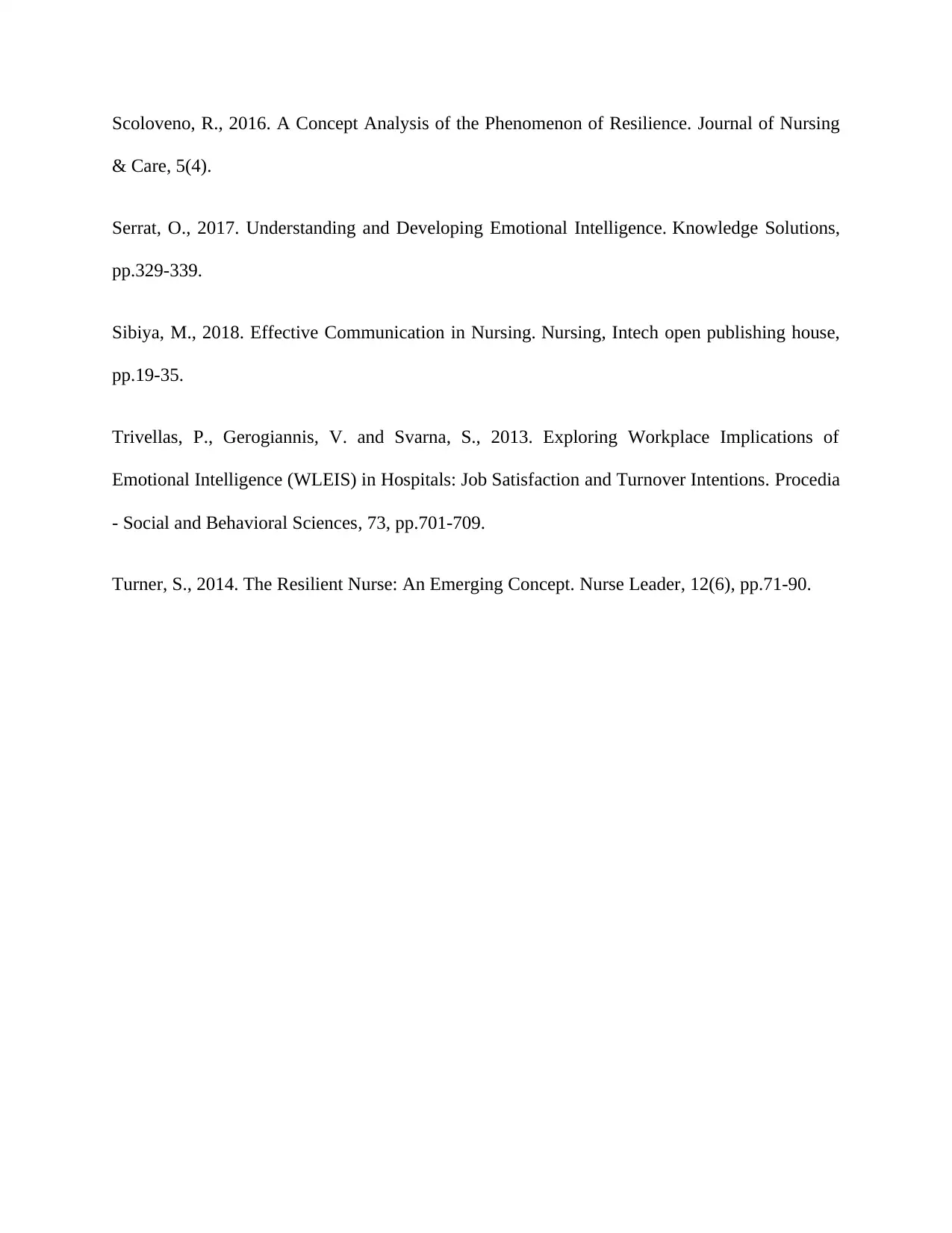
Scoloveno, R., 2016. A Concept Analysis of the Phenomenon of Resilience. Journal of Nursing
& Care, 5(4).
Serrat, O., 2017. Understanding and Developing Emotional Intelligence. Knowledge Solutions,
pp.329-339.
Sibiya, M., 2018. Effective Communication in Nursing. Nursing, Intech open publishing house,
pp.19-35.
Trivellas, P., Gerogiannis, V. and Svarna, S., 2013. Exploring Workplace Implications of
Emotional Intelligence (WLEIS) in Hospitals: Job Satisfaction and Turnover Intentions. Procedia
- Social and Behavioral Sciences, 73, pp.701-709.
Turner, S., 2014. The Resilient Nurse: An Emerging Concept. Nurse Leader, 12(6), pp.71-90.
& Care, 5(4).
Serrat, O., 2017. Understanding and Developing Emotional Intelligence. Knowledge Solutions,
pp.329-339.
Sibiya, M., 2018. Effective Communication in Nursing. Nursing, Intech open publishing house,
pp.19-35.
Trivellas, P., Gerogiannis, V. and Svarna, S., 2013. Exploring Workplace Implications of
Emotional Intelligence (WLEIS) in Hospitals: Job Satisfaction and Turnover Intentions. Procedia
- Social and Behavioral Sciences, 73, pp.701-709.
Turner, S., 2014. The Resilient Nurse: An Emerging Concept. Nurse Leader, 12(6), pp.71-90.
1 out of 11